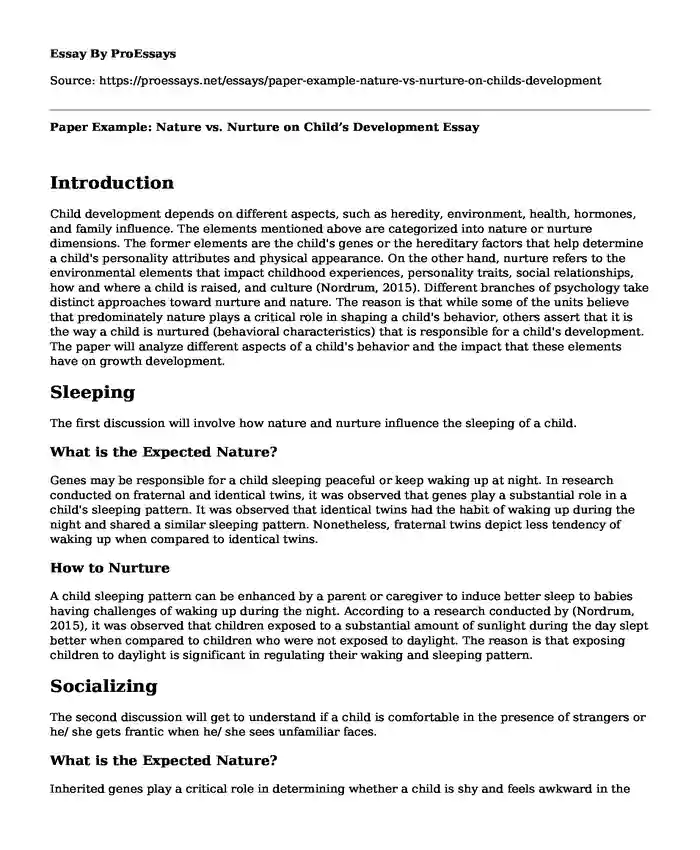Introduction
Child development depends on different aspects, such as heredity, environment, health, hormones, and family influence. The elements mentioned above are categorized into nature or nurture dimensions. The former elements are the child's genes or the hereditary factors that help determine a child's personality attributes and physical appearance. On the other hand, nurture refers to the environmental elements that impact childhood experiences, personality traits, social relationships, how and where a child is raised, and culture (Nordrum, 2015). Different branches of psychology take distinct approaches toward nurture and nature. The reason is that while some of the units believe that predominately nature plays a critical role in shaping a child's behavior, others assert that it is the way a child is nurtured (behavioral characteristics) that is responsible for a child's development. The paper will analyze different aspects of a child's behavior and the impact that these elements have on growth development.
Sleeping
The first discussion will involve how nature and nurture influence the sleeping of a child.
What is the Expected Nature?
Genes may be responsible for a child sleeping peaceful or keep waking up at night. In research conducted on fraternal and identical twins, it was observed that genes play a substantial role in a child's sleeping pattern. It was observed that identical twins had the habit of waking up during the night and shared a similar sleeping pattern. Nonetheless, fraternal twins depict less tendency of waking up when compared to identical twins.
How to Nurture
A child sleeping pattern can be enhanced by a parent or caregiver to induce better sleep to babies having challenges of waking up during the night. According to a research conducted by (Nordrum, 2015), it was observed that children exposed to a substantial amount of sunlight during the day slept better when compared to children who were not exposed to daylight. The reason is that exposing children to daylight is significant in regulating their waking and sleeping pattern.
Socializing
The second discussion will get to understand if a child is comfortable in the presence of strangers or he/ she gets frantic when he/ she sees unfamiliar faces.
What is the Expected Nature?
Inherited genes play a critical role in determining whether a child is shy and feels awkward in the presence of strangers or is highly social in the company of unfamiliar people. According to (Purpura & Tinelli, 2020), inherited temperament play a significant role in the way a child socialized to new faces since it is an attribute that they have genetically inherited from their parents.
How to Nurture
Parents have little responsibility to take towards children who are comfortable in the presence of unfamiliar faces. Nonetheless, parents or caregivers need to gradually enlighten their children to deal with strangers to avoid socially awkward situations (Hughes & Cutting, 2020). For instance, parents may take their children to playdates to encourage them to associate with other people or other social activities that involve interactions. However, it is important for parents not to coerce their children to become comfortable with strangers, making them warier.
Conclusion
Both nature and nurture play significant roles in children's development. Nature consists mostly of hereditary factors, while nurture is the environment in which a child is brought up. Sleep and socializing are some of the aspects discussed that depict. However, children may have challenges sleeping due to genetic factors, exposure to environmental factors such as sunlight during the day may help them sleep better during the night. In that perspective, both nature and nurture are critical in children's development.
References
Hughes, C., & Cutting, A. (2020). Nature, Nurture, and Individual Differences in Early Understanding of the Mind. American Psychological Society, 10(5). Retrieved 14 September 2020, from.
Nordrum, A. (2015). Nature vs. Nurture vs. NASA. Scientific American, 312(3), 22-23. https://doi.org/10.1038/scientificamerican0315-22
Purpura, G., & Tinelli, F. (2020). The development of vision between nature and nurture: clinical implications from visual neuroscience. Child's Nervous System, 36(5), 911-917. https://doi.org/10.1007/s00381-020-04554-1
Cite this page
Paper Example: Nature vs. Nurture on Child's Development. (2023, Dec 13). Retrieved from https://proessays.net/essays/paper-example-nature-vs-nurture-on-childs-development
If you are the original author of this essay and no longer wish to have it published on the ProEssays website, please click below to request its removal:
- American University in Cairo: Admission Letter
- Linguistic Principle Explaining to the Local Group of ASL Teachers
- Personal Essay Example: My Opportunity in Visiting Tokyo
- Compare and Contrast Essay Sample on Italian Identity and African American Identity
- Essay Sample on The Origin of Christmas Trees: From German-Americans to Global Celebrations
- Teamwork Drives Success - Free Essay Sample
- Challenges of Bias in IQ Tests and Strategies for Addressing Worldview Conflicts in Professional Settings







